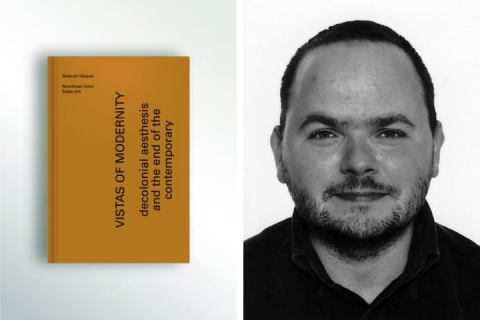A move towards plurality
The discussion about diversity at universities and other institutions is presently vivid. In his thought-provoking essay Vistas of Modernity, Rolando Vázquez Melken advocates moving from just talking to doing. “What we need is a way of thinking and doing where many worlds fit.”

Vázquez Melken, appointed at University College Utrecht as one of the five Cluster Chairs since August 2020, has seen it all happen in the past 13 years he has been living in the Netherlands. Back then, he says, decoloniality was a non-issue at institutions such as universities or museums.
“The Netherlands has a special position in this respect. Under what Professor Gloria Wekker aptly calls ‘white innocence’, there are plenty of unspoken histories. But there are positive signs as well, like the fact that the colonial underpinnings of the Black Pete are now being discussed in the public sphere. When I started the Decolonial Summer School at University College Roosevelt together with Professor Walter Mignolo from the University of Duke, it was one of the very few places where the decolonial was talked about. Now, a decade later, the discussion on institutional racism and the need to decolonize societal structures is vibrant. There is a lot happening also at the institutions. See for example the for the recent name change of the Witte de With Center for Contemporary Art in Rotterdam to Melly Art Institute.”
Postcards
“Diversity,” he writes in Vistas of Modernity, “is [crucially] about changing the ways in which we practice knowledge and culture, it is about the experiences that are produced and reproduced through these practices.”
“The book is written around early 20th century postcards, as these were key in the material culture of Europe since the end of the 19th century,” he says. “The postcards in the book are modern/colonial postcards, in the sense that they mostly depict the colonial imagery shown in the colonial exhibitions organised in modern European cities.”
“There is a tension in these postcards. While they were meant as pleasurable souvenirs, the pleasure they produced cannot be separated from coloniality. This shows how the well-being of the Europe has depended on the consumption of the life of others. While taking pleasure in the images of the colonial exhibition and their 'human zoos', people were in fact participating in that violence. It’s like a bar of chocolate: we enjoy it, but we don’t want to hear about the violence gone into making it. We have been made to enjoy unethical life. The urgent question today is how to bring ethics and joy together.”
"We need to change both the what, the who and the how we teach and research at universities."
Vázquez Melken’s take on diversity is broad. It has to do with participation of people from minoritized backgrounds in society, education and culture, but also with the transformation of our curricula and canons. This was the multilevel approach present in the diversity report Let’s do Diversity, which he co-authored in commission of University of Amsterdam in 2016.
“Our institutions persist in colonial structures, where you see the top leaders being overwhelmingly white males while women of color work in the basic services. What we have reached in the past decade, is that we can at least talk about it. At University College Utrecht, we now have a diversity committee, and at Utrecht University, I participate in a research collective called CRIDE, or Critical Decoloniality, which is concerned with decolonial transformation of institutions. The final chapter of Vistas of Modernity is exactly about that: how to transform the ways of doing, not just the talking.”
The what, the who and the how
“It’s a delicate moment we are witnessing right now. We debate and discuss a lot, but by so far little has been transformed into action, and that is the next step we will need to take. We should include decolonial awareness in the way we train teachers and for example have diversity training as a requisite for obtaining basic and senior teacher’s qualification. Because, finally, it is the practices it all comes down to. Having a diversity committee should lead us beyond the talking to the doing. We need start to think of the transformation affirming to doing. For this we need to change both the what, the who and the how we teach and research at universities.”
“Importantly, diversity has to do with methodology, with how we do things. Positionality is essential for us. Anyone acknowledging his or her position in relation to race, gender, class, ableness and so forth can do diversity work and work from their positionality towards social justice. We should teach disciplines in a positioned way and by so doing transform the modern/colonial structures. We can move towards plural epistemologies, plural pedagogies, plural aesthesis.”
“Decoloniality is also about epistemology, transforming forms of knowing, and about aesthetics, transforming our forms of sensing. It has to do with awareness of the way we perceive the world and who controls it. In fact, we are not moving towards the next paradigm, but towards plurality. As the Zapatista movement in Mexico expresses it: what we need is a way of thinking and doing where many worlds fit."
Rolando Vázquez Melken, Vistas of Modernity - decolonial aesthesis and the end of the contemporary. Mondriaan Fund, 2020 (ISBN 978-90-76936-53-6).
Next summer, the Decolonial Summer School will take place at Van Abbe Museum in Eindhoven as part of University College Utrecht and the Utrecht Summer School under the title “Learning to Unlearn Decolonially”. More information
Read also: Hicham Khalidi and Rolando Vázquez: “A New Bauhaus? The Debate for a More Inclusive Europe”.
On 3 February 2021, Rolando Vázquez spoke about his Vistas of Modernity and decolonial education at Melly Art Institute. Watch the recording (Rolando starting from 23:00).

